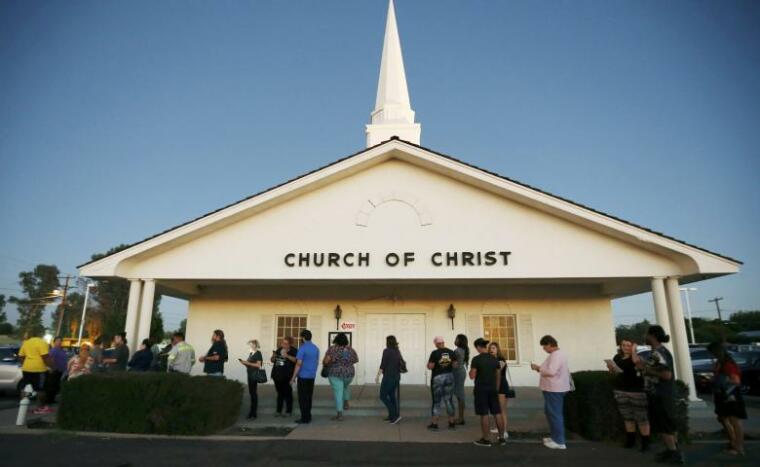Most churches did not talk about politics during election season, says Pew study

Most American churches avoided explicit discussion about politics during the election period, according to a new study.
According to the study released by Pew Research Center last Tuesday, 14 percent of the voters who attended religious services at least once a month have said that their church provided information about the political parties or candidates. Only five percent were told by clergy to vote a certain way.
The survey results revealed that Catholic and white evangelicals are more likely than white mainline Protestants to say that their places of worship provided information related to the election.
Twenty-two percent of Catholics who attend mass at least once a month said that there was information about political parties or candidates in their parishes. Among white evangelical protestants who attend church monthly, 16 percent admitted receiving information about the election within the church. Only five percent of white mainline protestants said the same.
A related survey published by LifeWay Research in October revealed that pastors were reluctant to endorse politicians during religious services. Ninety eight percent of the pastors who participated in the study said they have not endorsed a particular candidate.
Only one percent admitted endorsing a candidate and another one percent said they were not sure.
Twenty-two percent of the pastors said that they endorsed a candidate outside the church while 77 percent said they did not.
The support for endorsing candidates from the pulpit has decreased compared to the survey results in 2012. That year, 10 percent of Protestant pastors agreed that clergy should endorse a candidate inside the church while 87 percent disagreed. Forty-four percent said they endorsed a candidate outside the church while 52 percent said they have not.
Tax-exempt non-profit organizations such as churches are not allowed to engage in political campaigns under the Johnson Amendment, which was sponsored by Lyndon Johnson in 1954.
President-elect Donald Trump promised to repeal the law last July.
"You are absolutely shunned if you're an evangelical if you want to talk religion, you lose your tax-exempt status," said Trump.
"We're going to get rid of that horrible Johnson amendment and we're going to let evangelicals, we're going to let Christians and Jews and people of religion talk without being afraid to talk," he added.
 Christians don't have to affirm transgenderism, but they can’t express that view at work: tribunal
Christians don't have to affirm transgenderism, but they can’t express that view at work: tribunal Archaeology discovery: Medieval Christian prayer beads found on Holy Island
Archaeology discovery: Medieval Christian prayer beads found on Holy Island Presbyterian Church in America votes to leave National Association of Evangelicals
Presbyterian Church in America votes to leave National Association of Evangelicals Over 50 killed in 'vile and satanic' attack at Nigerian church on Pentecost Sunday
Over 50 killed in 'vile and satanic' attack at Nigerian church on Pentecost Sunday Ukrainian Orthodox Church severs ties with Moscow over Patriarch Kirill's support for Putin's war
Ukrainian Orthodox Church severs ties with Moscow over Patriarch Kirill's support for Putin's war Islamic State kills 20 Nigerian Christians as revenge for US airstrike
Islamic State kills 20 Nigerian Christians as revenge for US airstrike Man who served 33 years in prison for murder leads inmates to Christ
Man who served 33 years in prison for murder leads inmates to Christ


 Nigerian student beaten to death, body burned over ‘blasphemous’ WhatsApp message
Nigerian student beaten to death, body burned over ‘blasphemous’ WhatsApp message 'A new low': World reacts after Hong Kong arrests 90-year-old Cardinal Joseph Zen
'A new low': World reacts after Hong Kong arrests 90-year-old Cardinal Joseph Zen Iran sentences Christian man to 10 years in prison for hosting house church worship gathering
Iran sentences Christian man to 10 years in prison for hosting house church worship gathering French Guyana: Pastor shot dead, church set on fire after meeting delegation of Evangelicals
French Guyana: Pastor shot dead, church set on fire after meeting delegation of Evangelicals ‘Talking Jesus’ report finds only 6% of UK adults identify as practicing Christians
‘Talking Jesus’ report finds only 6% of UK adults identify as practicing Christians Mission Eurasia ministry center blown up in Ukraine, hundreds of Bibles destroyed: 'God will provide'
Mission Eurasia ministry center blown up in Ukraine, hundreds of Bibles destroyed: 'God will provide' Church holds service for first time after ISIS desecrated it 8 years ago
Church holds service for first time after ISIS desecrated it 8 years ago Burger King apologizes for 'offensive campaign' using Jesus' words at the Last Supper
Burger King apologizes for 'offensive campaign' using Jesus' words at the Last Supper Uganda: Muslims abduct teacher, burn him inside mosque for praying in Christ’s name
Uganda: Muslims abduct teacher, burn him inside mosque for praying in Christ’s name